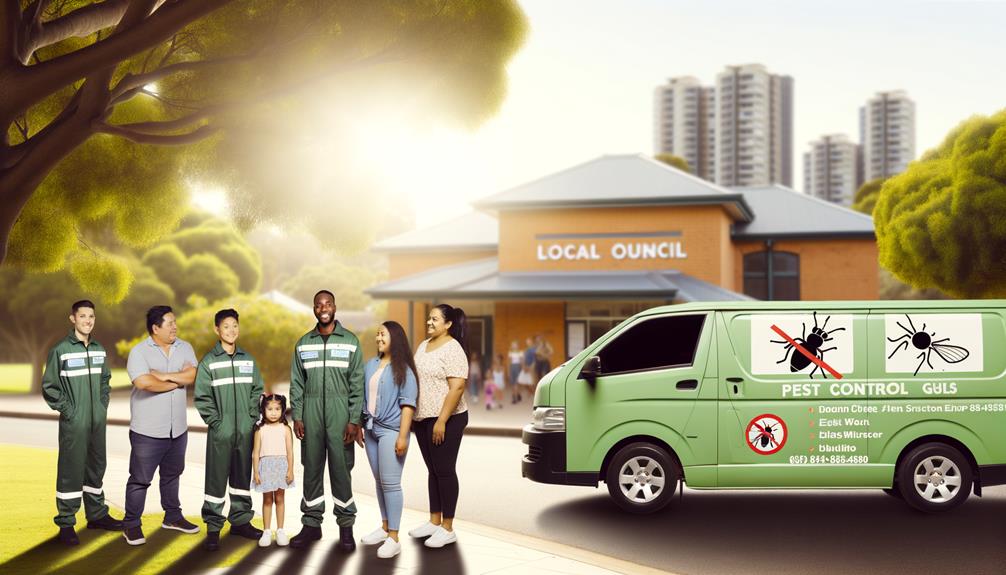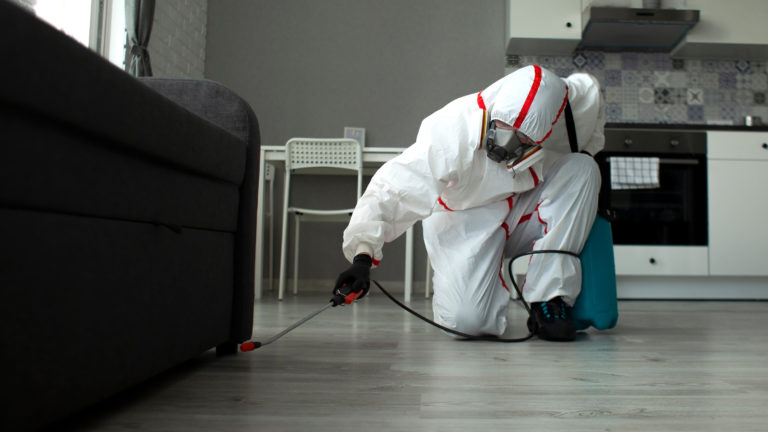Pondering pest problems prompts questions about the participation of local councils in controlling these unwelcome visitors. You might wonder if your council offers pest control services and what types of pests they tackle. While some councils provide comprehensive solutions, others might have limitations that leave you looking for alternative options. Factors such as your location, the nature of the pest problem, and council resources play a pivotal role in determining the extent of assistance you can receive. So, before you reach out for help, let’s explore the intriguing dynamics between local councils and pest control services, uncovering what you can expect and when you might need to seek help elsewhere.
Key Takeaways
- Local councils offer pest control services to ensure public health and safety.
- Residents can report pest issues to their local council for assistance.
- Council pest control services cover a wide range of pests and include educational campaigns.
- Costs and eligibility for council pest control services vary, possibly offering more affordable options.
Role of Local Councils

Local councils play a pivotal role in tackling pest control issues within their communities, ensuring the health and safety of residents. As a member of the community, it’s comforting to know that your local council holds the responsibility for creating and maintaining a safe environment, free from the harms of pest infestations. Council accountability isn’t just a term; it’s a promise to safeguard the well-being of the community by managing and preventing pest-related problems effectively.
Your local council is instrumental in raising public awareness about the importance of pest control. Through educational campaigns and resources, they empower you with knowledge on how to protect your home and neighbourhood from potential pest threats. This proactive approach fosters a sense of belonging and collective responsibility among residents, making each person an active participant in maintaining the community’s health standards.
Understanding the council’s role in pest control equips you with the confidence to report issues and seek assistance when necessary. It’s your right to live in a safe, pest-free environment, and your local council is there to ensure that this right is upheld through diligent pest control measures and community education.
Common Pest Control Services

You’ll find that common pest control services cover a wide array of pests, from rodents to insects, ensuring your living or working space remains safe and comfortable. Whether you’re looking for residential services to protect your home or commercial solutions to safeguard your business, there’s a tailored approach to meet your needs. These services not only address current infestations but also implement preventative measures to thwart future pest problems.
Types of Pests Managed
Pest control services typically address a wide range of unwelcome visitors, from rodents to insects, ensuring your home remains free from infestation. These services are not just about eliminating pests; they’re about creating a secure, healthy environment for you and your family. Through expert pest identification and prevention strategies, professionals tackle everything from ants, cockroaches, and termites, to mice, rats, and even birds that may pose health risks or cause damage to your property.
Effective pest management involves more than just extermination. It’s about understanding the behaviour of different pests, identifying potential entry points, and implementing measures to prevent future issues. By staying informed about the types of pests managed, you’re taking a proactive step towards safeguarding your home and ensuring a pest-free living space.
Residential Service Overview
Often, homeowners seek out professional pest control services to combat infestations and maintain a safe, comfortable living environment. These services typically range from addressing common nuisances like ants and cockroaches to more formidable foes such as termites and rodents. While DIY methods and natural repellents can offer some relief, they often fall short of completely resolving the problem. That’s where professional residential pest control comes in, offering tailored solutions that not only rid your home of pests but also prevent future invasions. By employing a mix of advanced techniques and products, experts ensure that your home remains a sanctuary, free from unwanted guests. This approach not only guarantees immediate relief but also secures long-term protection, giving you peace of mind and a sense of belonging in a clean, pest-free environment.
Commercial Solutions Offered
While homeowners may primarily focus on residential pest control, businesses also require robust solutions to protect their premises and reputation from pest-related issues. You’re part of a community that values health, safety, and environmental responsibility. That’s why commercial pest control services emphasize green initiatives, ensuring your business’s practices align with regulatory compliance. These services offer comprehensive management plans tailored to your specific industry needs, from restaurants and hotels to warehouses and office buildings. They understand the unique challenges you face and provide discreet, effective treatments that minimize disruption to your operations. By partnering with a pest control provider that prioritizes green methods, you’re not just safeguarding your business—you’re also contributing to a healthier planet for everyone in your community.
Limitations of Council Services

Many local councils face significant challenges in providing comprehensive pest control services due to budgetary constraints and regulatory limitations. You might find that your council’s ability to tackle pests is often limited by the funds available and strict regulations designed to minimize environmental impacts. This situation can leave you feeling a bit stranded, especially when you’re dealing with pests that pose a risk to your health or property.
Moreover, while councils are keen on protecting public health, they must also consider the ecological consequences of their actions. This balancing act means that sometimes, they can’t use the most potent chemicals or methods, pushing them to recommend or adopt more environmentally friendly, albeit potentially less immediate, solutions.
As a result, you’re likely encouraged to explore DIY methods for dealing with minor pest issues. While this empowers you to take control, it also means you’re taking on the responsibility of ensuring those methods are safe and effective. Remember, you’re not alone in this. Your community shares in the challenge of pest control, and together, you can find ways to overcome these limitations, safeguarding both your homes and the environment.
Factors Influencing Council Involvement

Councils’ decisions to engage in pest control activities are shaped by a variety of factors, including public health concerns, environmental implications, and available resources. You’re part of a community, and it’s crucial to understand that your local council’s approach to pest control isn’t arbitrary. It’s deeply influenced by the need to protect public health. Pests can carry diseases, and mitigating their presence is paramount to keeping communities safe.
Moreover, environmental considerations play a significant role. Your council weighs the ecological impact of pest control methods, striving to choose solutions that minimize harm to the environment. This balance ensures that actions taken today don’t lead to bigger problems tomorrow.
Public education is another key factor. Councils often prioritize informing you and your neighbours about preventing pest problems. This proactive approach can significantly reduce the need for intervention.
Lastly, the impact of legislation cannot be overstated. Laws and regulations set the framework within which councils operate, dictating what they can and cannot do. This legislative landscape ensures that pest control measures are safe, effective, and respectful of both human health and the environment.
How to Request Council Help

If you’re facing a pest problem, it’s vital to know how to effectively request help from your local council. Understanding the eligibility criteria and the application process is your first step towards resolving the issue. Your local council has specific guidelines determining who qualifies for pest control services. Typically, these criteria revolve around the type of pest, the severity of the infestation, and whether the property is residential or commercial. It’s crucial to check these guidelines on your council’s website or by contacting them directly.
To initiate the application process, you’ll need to gather evidence of the pest problem. This could include photographs or a detailed description of the infestation. With your evidence ready, locate the pest control service request form on your council’s website or visit your local council office to obtain a physical copy. Fill out the form with precise information about the problem, your contact details, and any relevant evidence you’ve collected. Submit your application as instructed—either online, via email, or in person.
After submission, the council will review your request, which may include a visit to your property to assess the situation. Throughout this process, it’s important to be patient and cooperative, providing any additional information the council might need to help you effectively.
Costs and Fees Explained
After understanding how to request council help for pest problems, it’s also essential to grasp the costs and fees involved with these services. Local councils often offer pest control services at a fee, which varies depending on the type of pest and the severity of the infestation. You’re part of a community that values clear, upfront information, especially when it comes to costs that might affect your household budget.
Payment methods for these services are designed to be as convenient as possible, accommodating a wide range of preferences. Most councils accept online payments, credit or debit cards, and sometimes even direct bank transfers. It’s all about making the process seamless for you.
Understanding refund policies is crucial, too. While councils strive to provide successful pest control services, there are instances where you might be eligible for a refund—such as service cancellations or if the service didn’t meet the agreed standards. Each council has its own set of policies, so it’s important to inquire directly to ensure you’re fully informed.
Private Vs. Council Pest Control

When you’re weighing your options between private and council pest control services, it’s crucial to consider the cost comparison, service scope, and response time. Private companies often offer faster services but at a higher cost, while council services might be more affordable but have longer wait times. Understanding these differences can help you make an informed decision that best suits your needs and budget.
Cost Comparison
Determining whether to engage private pest control services or rely on council offerings often boils down to a critical factor: cost comparison. When considering pricing strategies, it’s essential to understand that private companies might offer more flexible plans tailored to your specific needs, potentially leading to higher costs. On the other hand, council services, while possibly more generic, could come at a subsidized rate, making them a budget-friendly option. You’re also more likely to find discount eligibility through council services, especially if you’re part of a vulnerable group or meet certain criteria. This aspect can significantly reduce the financial burden of pest control. In essence, while private services offer customization, council pest control can provide a more accessible solution for those conscious of their spending.
Service Scope
Exploring the range of services provided, private pest control companies often boast a broader spectrum of solutions than their council counterparts, catering to both common and less typical infestations with equal proficiency. This diversity in service scope means you’re more likely to find a tailored solution that fits your specific pest problem. Private firms prioritize service efficiency, ensuring that your issue is addressed promptly and effectively. Moreover, they’re stringent about regulatory compliance, giving you peace of mind that the methods and substances used in your home or business adhere to the latest health and safety standards. In contrast, council services might be more limited in scope, focusing on widespread, public health-related pest issues rather than individualized concerns.
Response Time
While service scope is a crucial aspect in selecting pest control options, it’s also essential to consider how quickly each service can address your issue, particularly when comparing private companies to council services. Private pest control firms often boast rapid response times, thanks to cutting-edge response technologies and streamlined emergency protocols. They’re tuned to react swiftly, understanding that time is of the essence in pest control scenarios. Council services, while thorough, may not match this speed due to procedural steps required in public service delivery. However, they offer a sense of belonging and community accountability. As you weigh your options, remember that both private and council services aim to protect your home, but the speed and technologies at their disposal can vary significantly.
Seeking Alternative Solutions

Local councils often seek innovative, environmentally friendly alternatives to traditional pest control methods, aiming to balance efficacy with ecological responsibility. You’re part of a community that values not just the immediate eradication of pests but also the long-term health of our environment. That’s why exploring natural deterrents and DIY methods has become a cornerstone of local pest management strategies.
Natural deterrents, such as specific plants that repel certain pests or the introduction of natural predators, are effective ways to manage pest populations without resorting to harsh chemicals. These methods not only protect the ecosystem but also ensure the safety of the community members and their pets.
DIY methods, on the other hand, empower you and your neighbours to take proactive steps in managing pests. From homemade traps to natural repellents, these strategies allow for a personalized approach to pest control, fostering a sense of belonging and participation in community health.
You may also enjoy reading this article
Was This Article Helpful?
- Please provide feedback and comments to help us improve our content.
- Share your experiences and any additional tips you have for dealing with pests.
Share this Post


